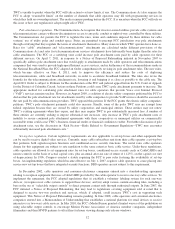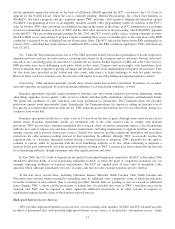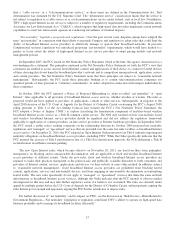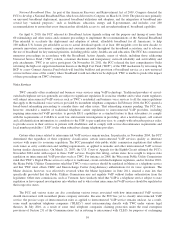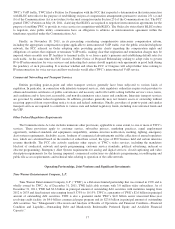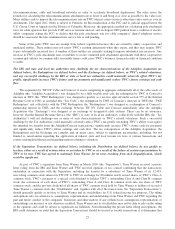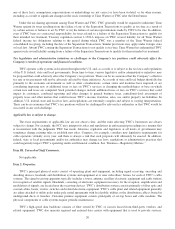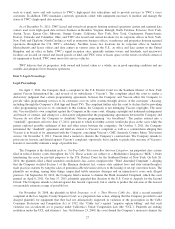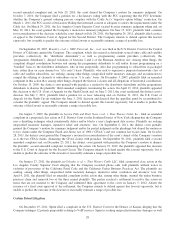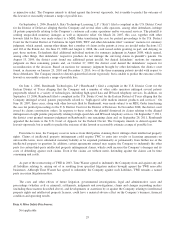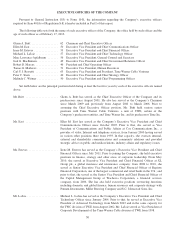Time Warner Cable 2011 Annual Report Download - page 30
Download and view the complete annual report
Please find page 30 of the 2011 Time Warner Cable annual report below. You can navigate through the pages in the report by either clicking on the pages listed below, or by using the keyword search tool below to find specific information within the annual report.Such an event also could result in large expenditures necessary to repair or replace such networks or information systems or
to protect them from similar events in the future. Significant incidents could result in a disruption of TWC’s operations,
customer dissatisfaction, or a loss of customers or revenues.
Furthermore, TWC’s operating activities could be subject to risks caused by misappropriation, misuse, leakage,
falsification and accidental release or loss of information maintained in TWC’s information technology systems and
networks, including customer, personnel and vendor data. TWC could be exposed to significant costs if such risks were to
materialize, and such events could damage the reputation and credibility of TWC and its business and have a negative impact
on its revenues. TWC also could be required to expend significant capital and other resources to remedy any such security
breach. As a result of the increasing awareness concerning the importance of safeguarding personal information, the potential
misuse of such information and legislation that has been adopted or is being considered regarding the protection, privacy and
security of personal information, information-related risks are increasing, particularly for businesses like TWC’s that handle
a large amount of personal customer data.
TWC’s business may be adversely affected if TWC cannot continue to license or enforce the intellectual property rights on
which its business depends.
TWC relies on patent, copyright, trademark and trade secret laws and licenses and other agreements with its employees,
customers, suppliers and other parties, to establish and maintain its intellectual property rights in technology and the products
and services used in TWC’s operations. However, any of TWC’s intellectual property rights could be challenged or
invalidated, or such intellectual property rights may not be sufficient to permit TWC to take advantage of current industry
trends or otherwise to provide competitive advantages, which could result in costly redesign efforts, discontinuance of certain
product or service offerings or other competitive harm. Claims of intellectual property infringement could require TWC to
enter into royalty or licensing agreements on unfavorable terms, incur substantial monetary liability or be enjoined
preliminarily or permanently from further use of the intellectual property in question, which could require TWC to change its
business practices or offerings and limit its ability to compete effectively. Even claims without merit can be time-consuming
and costly to defend and may divert management’s attention and resources away from TWC’s businesses. Also, because of
the rapid pace of technological change, TWC relies on technologies developed or licensed by third parties, and TWC may not
be able to obtain or continue to obtain licenses from these third parties on reasonable terms, if at all.
TWC is party to agreements with Time Warner and an affiliate of Time Warner governing the use of “Time Warner
Cable” and “Road Runner” that may be terminated if TWC fails to perform its obligations under those agreements or if
TWC undergoes a specified change of control.
TWC licenses “Time Warner Cable” and “Road Runner” from Time Warner Inc. (“Time Warner”) and an affiliate of
Time Warner, respectively. These license agreements may be terminated by Time Warner or its affiliate if TWC commits a
significant breach of its obligations under such agreements, undergoes a specified change of control, or materially fails to
maintain the quality standards established for the use of these trademarks and the products and services related to these
trademarks.
If Time Warner or its affiliate terminates these brand name license agreements, TWC would lose the goodwill
associated with its brand names and be forced to develop new brand names, which would likely require substantial
expenditures, and TWC’s business, financial results or financial condition could be materially adversely affected.
The accounting treatment of goodwill and other identified intangibles could result in future asset impairments, which
would be recorded as operating losses.
Authoritative guidance issued by the Financial Accounting Standards Board (“FASB”) requires that goodwill, including
the goodwill included in the carrying value of investments accounted for using the equity method of accounting, and other
intangible assets deemed to have indefinite useful lives, such as cable franchise rights, cease to be amortized. The guidance
requires that goodwill and certain intangible assets be tested annually for impairment or upon the occurrence of a triggering
event. If the carrying value of goodwill or a certain intangible asset exceeds its estimated fair value, an impairment charge is
recognized in an amount equal to that excess. Any such impairment is required to be recorded as a noncash operating loss.
TWC’s 2011 annual impairment analysis, which was performed as of July 1, 2011, did not result in any goodwill or
cable franchise rights impairment charges. However, it is possible that impairment charges may be recorded in the future to
22


